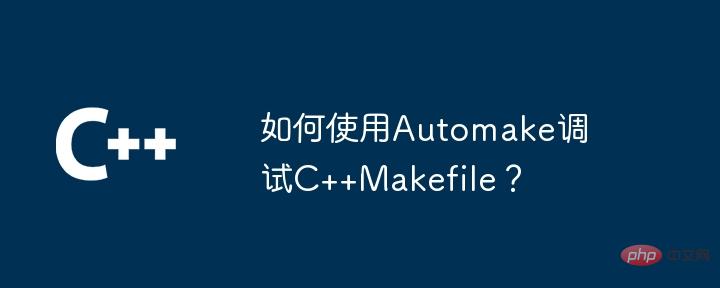
Methods for debugging C++ Makefile Add debugging flags (-Wall -Wextra -pedantic) Use automake --trace to view the Automake command Use automake --auto-make to quickly generate Makefile Use make VERBOSE=1 to output more detailed execution information

How to use Automake to debug C++ Makefile
Automake is a tool that can help us automatically generate Makefile, thereby simplifying our compilation work . When debugging C++ Makefile, Automake provides some useful functions that can help us quickly locate and solve problems.
Add debug flags
Adding debug flags in the Makefile can help us identify compilation and linking errors. For this we can use the following flags:
CPPFLAGS += -Wall -Wextra -pedantic
Use automake --trace
##automake --trace option will print out when running Detailed commands executed by Automake. This is useful for viewing the contents of the Makefile generated by Automake. We can use this option with the following command:
automake --trace
Use automake --auto-make
automake --auto-make option will automatically Generate Makefile without creating intermediate files. This helps us quickly test changes in the Makefile without having to rebuild it every time. We can use this option with the following command:
automake --auto-make
Use make VERBOSE=1
VERBOSE=1 option to make the make command print out more Detailed information, including commands being executed and errors detected. We can use this option through the following command:
make VERBOSE=1
Practical case
The following is a simple C++ Makefile, we can use Automake to debug it:SRC = main.cpp
OBJ = main.o
EXE = main
CPPFLAGS += -Wall -Wextra -pedantic
all: $(EXE)
$(EXE): $(OBJ)
$(CXX) $(CXXFLAGS) $^ -o $@
$(OBJ): $(SRC)
$(CXX) $(CPPFLAGS) -c $^Use Automake to debug the Makefile
We can use the following commands to use Automake to debug this Makefile:automake --trace automake --auto-make make VERBOSE=1
The above is the detailed content of How to use Automake to debug C++Makefile?. For more information, please follow other related articles on the PHP Chinese website!




